Configuring Storage Pools
The Recording Library provides the option to choose where to store your recordings. By default Chronicall will automatically store the recordings on the C: Drive unless otherwise noted.
This article will show you how to manage and configure your Recording Storage Location and Configure your drive pool.
Accessing Storage Pools
Once Recording Library is installed, open Chronicall and go into System Settings > Recording Libraries. Then click on the ellipses button ("...").
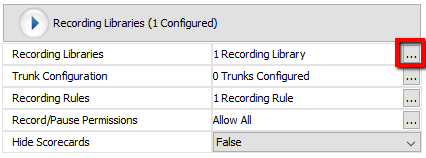
Select your existing Recording Library and hit "Edit."
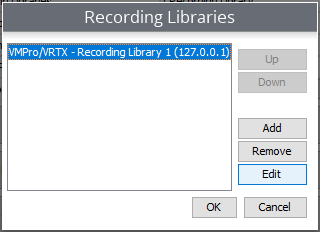
Next, select the ellipses ("...") where it says "Recording Storage Location...Configure Drive Pooling."
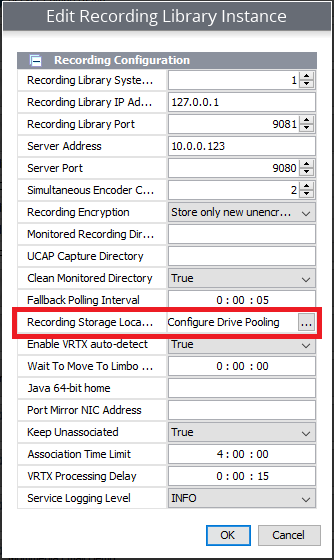
For Local Storage Pools
As previously mentioned, Chronicall Recording Library will create a default storage pool when the Recording Library is first installed. Typically the default location is:
"\Xima Software\Chronicall\recording library", and will be relative to the server and file path that Chronicall is installed on.
Example:
C:Program Files (x86) \Xima Software\Chronicall\recording library
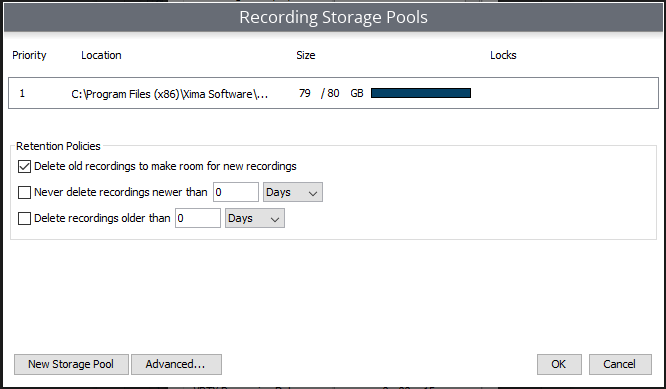
This window will show you where the Chronicall Recording Library stores the recordings. You will now have the option to add or edit a storage pool.
- To Edit the location storage pool, click on the existing storage pool location and select the pencil tool.
- To Add a new New Storage Pool, click on the "New Storage Pool" button in the bottom left hand corner.
When adding (or editing) a storage pool, the following options appear:
- Location (required): If you are interested in changing the location of the storage pool this is where you enter the location path to the directory where you wish to store the recordings (relative to the server running the Recording Library.
- Direct Pool Access (optional): This is the location path to the directory where you wish to store the recordings (relative to the server running Chronicall.).
Note: This is for environments storing recordings across a network. - Limit storage space to [#] [File Size]: This will limit the amount of storage space the recordings can take up.
- Do not save new recordings to this pool: Checking this box will deny new recordings from being saved to this storage pool.
- Do not delete recordings from this pool: Checking this will deny agents from deleting recordings stored in this pool.
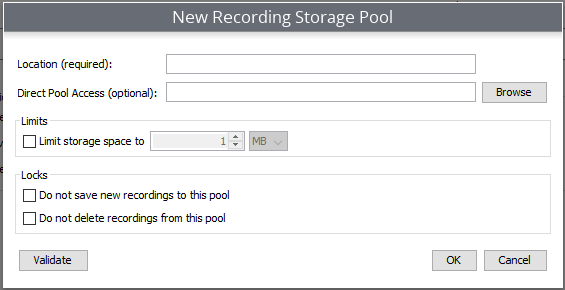
For Network Storage Pools
In some situations the server whereon the Chronicall Recording Library is installed is not ideal for storing recordings. In this scenario, you will want to setup a network storage location. On the Recording Storage Pools page, click on "Advanced..." and select "New Windows Network Storage Pool."
This page will ask you for information about the location of the shared directory. Each field is described below.
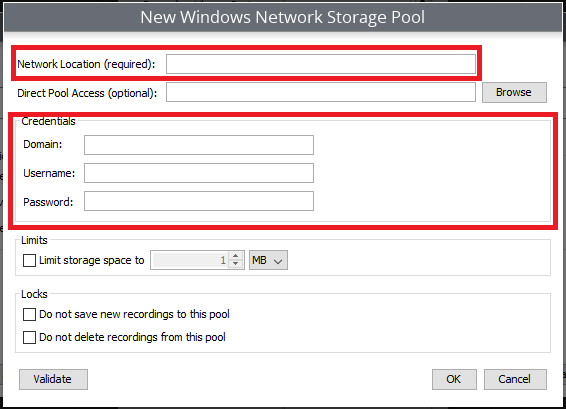
- Network Location (required): Enter the file path of the network location here.
- Direct Pool Access (optional): If the specified Network Location happens to be on the Chronicall.
- Domain: Domain information if necessary. If there is no Domain in use, use '?'.
- Username: Enter the username if necessary.
- Password: Enter password if necessary.
- Limit storage space to [#] [File Size]: This will limit the amount of storage space the recordings can take up.
- Do not save new recordings to this pool: Checking this will deny new recordings from being saved to this storage pool.
- Do not delete recordings from this pool: Checking this will deny agents from deleting recordings stored in this pool.
- Validate: Click on "Validate" when all settings are complete to validate everything is correct.
Creating a Retention Policy
By default Chronicall will store the recordings indefinitely (unless you run out of space on your hard drive). The Chronicall Recording Library storage pools also have retention policies that give you additional options regarding how long you wish to keep recordings.
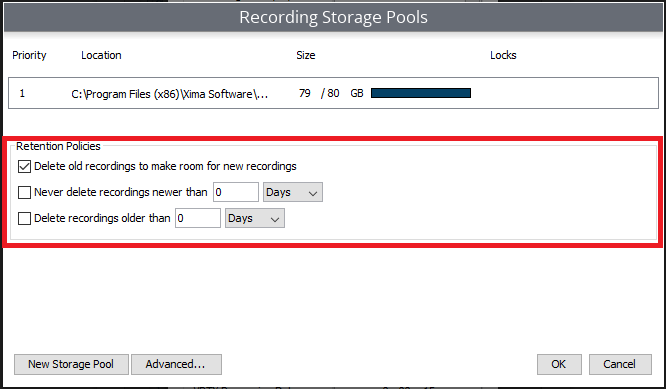
By selecting the "Delete old recordings..." option, you will now be able to make continual space. As recordings hit the selected thresholds, they will be purged (deleted) and will make space for new recordings. You will have two options:
- Never delete recordings newer than [desired number] [Days, Months, or Years]
- Delete recordings older than [desired number] [Days, Months, or Years]
Once you have selected your desired thresholds, Chronicall will automatically follow the desired time frame requirements and old recordings will be deleted to make room for new recordings.
Updated 3 months ago